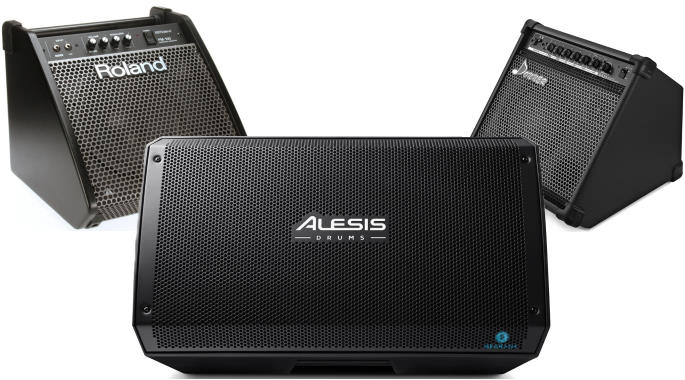
Disclosure
We recommend all products independently of 3rd parties including advertisers. We earn advertising fees from:
• • • • •
• • • • •
Amazon
As an Amazon Associate we earn from qualifying purchases.
• • • • •
More Drum Guides
For every new e-drum kit, comes the endless search for the best drum amp that will fit the setup. You’re wondering, which drum amp is best for you?
Read along, because we’ve combed through the crowd of products to make it easy. We’ll take a closer look at the highest-rated electronic drum amps and monitors. These products are based were assessed through the market research we’ve compiled and processed via the Gearank Algorithm.
The best electronic drum amp strikes the perfect balance between volume and convenience. It is also great at reproducing the punch and nuances of percussion and drum instruments.
Playing e-drums through loudspeakers impacts your overall sound produced and playing experience, and this is the reason why you ought to consider quality, and not just settle with whichever e-drum amp is available.
The Best Electronic Drum Amps – 2024
| Gearank* | SRC* | Check Price | ||||||
|---|---|---|---|---|---|---|---|---|
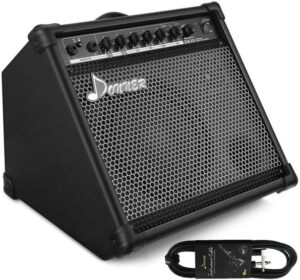
|
Donner DA-35 | 91 | 550+ | |||||
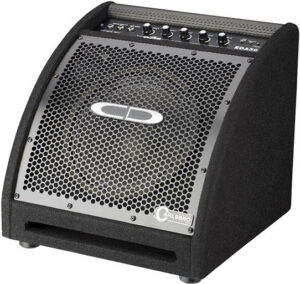
|
Carlsbro EDA 50 | 91 | 90+ | |||||
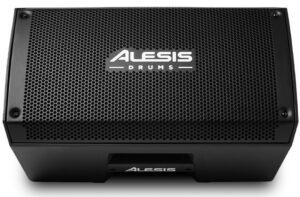
|
Alesis Strike Amp 8 | 91 | 650+ | |||||
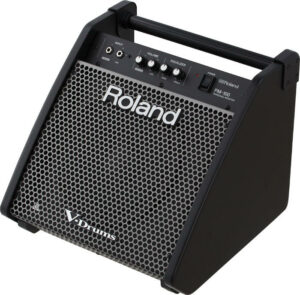
|
Roland PM-100 | 92 | 450+ | |||||
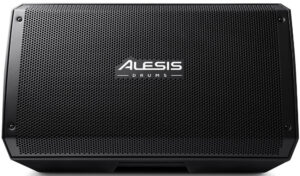
|
Alesis Strike Amp 12 | 94 | 600+ | |||||
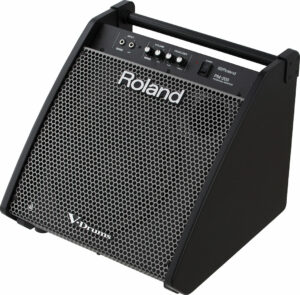
|
Roland PM-200 | 93 | 125+ | |||||
| Quiet Practice Option | ||||||||
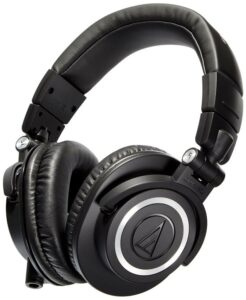
|
Audio-Technica ATH-M50x | 94 | 27350+ | |||||
Donner DA-35
- Limited volume
- The low end not as strong
- Good value e-drum amp
- Compact and portable
- Bluetooth-ready
- 2-Channel amplifier section
Donner has had their share of highly rated affordable gear making it into our lists over here at Gearank, and it's easy to see why. They often pack a lot of value into their products to make up for being a relatively lesser-known brand and are steadily gaining a good reputation for that.
A case in point is the Donner DA-35 coming in at 35 watts of power, the lowest-watt drum amplifier currently on our recommended list. It's a long-time recipient of favorable feedback regarding its convenient size, weight, and versatility. This drum amp doesn't go loud enough for most gigs, but it has enough power for intimate settings, such as an informal jam-along in the living room. This is geared more towards practice and home use.
It has a flat balanced sound that you can shape via its built-in 3-band EQ, but given its small woofer, the low-end is not as deep.
A small, well-appreciated touch for beginners is the included cable to connect to your e-drums. While most drum amplifiers will only come with the power cord, Donner chooses to give you one less thing to worry about. This electronic drum amp is big on flexibility with its Bluetooth mode for audio playback and DI out for connecting to external active speakers or PA systems.
Despite it being the cheapest choice currently on our list, it packs a lot of features and can even be a small all-rounder PA system for occasional small get-togethers.
If you want a practice drum amp that's packed full of features but is light in both weight and price, this one should be your pick of the lot. Just manage your volume expectations, and you should be good to go.
This is the best drum monitor for those who want an affordable practice and small-venue amp.
Specifications
- Inputs & Outputs: x1 mic/line, x1 line, x1 aux, x1 headphone output, D.I. out.
- Bluetooth Capability: Music playback from external device
- Output Power: 35 Watts
- Weight and Size: 17.6 lbs, 13.78" x 11.02" x 11.02"
- Driver and Speaker Size: 2" Tweeter, 8" Woofer
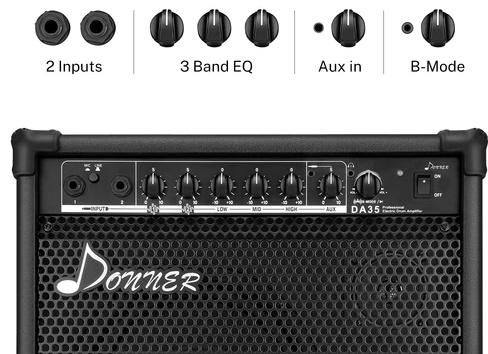
| Website | Source | *Rating Value |
| YouTube | Mark Chance | 90/100 |
Carlsbro EDA 50
- Bulky and heavy for a 50W drum amp
- Can get muddy when cranked too hard
- Enough volume for stage monitor use
- Uncolored sound
- Solid build quality
- Responsive EQ controls
The Carlsbro EDA-50 has occupied its place in this guide for 4 editions now. Rightly so because it receives consistently high ratings across retailers.
With its 50W rating and 10" bass driver, the volume is enough for use on stage as an e-drum monitor. It has an uncolored sound that accurately represents what a drummer would hear when using headphones. This transparency also means that you get to hear the nuances of the different drum kits and sounds that you have on your kit.
It does get muddy when cranked too hard, so make sure to manage the volume. In rehearsals or performances, you might have a hard time keeping up with musicians with bigger amps.
Its tonal options are quite versatile for the price, sporting a responsive 3-band equalizer great for tweakers and most will find 3 knobs more than enough to find the right sound especially when you do most of the fine-tuning inside your e-drum brain. Bass has a good definition but is not as deep, still, it is more than enough for home practice.
Availability might be a factor since it seems to be more available from UK-based sites which is not too surprising considering Carlsbro is a British brand. Because of its solid build, this quality drum amp is a bit on the heavy side, but still reasonably portable.
The Donner edges it out in versatility with its dedicated mic/line switch, Bluetooth, and separate volume knobs for each channel allowing it to double up as a simple PA system for singing and other instruments in a pinch. But the extra 15 watts of the EDA-50 might make all the difference when it comes to being loud enough for your specific application.
The Carlsbro EDA-50 is the best amp for electronic drums when it comes to ease of use and build quality. It is worth considering for those who want a reliable plug-and-play amp.
Specifications
- Inputs & Outputs: x2 Drum input (left/mono, right), x1 aux , x1 line, x1 headphone out
- Bluetooth Capability: None
- Output Power: 50 Watts
- Weight and Size: 34 lbs, 15” x 14” x 16”
- Driver and Speaker Size: 1 x 10" Woofer, 1 x 2" Tweeter
| Website | Source | *Rating Value |
| YouTube | Sutton Music Centre | 90/100 |
Alesis Strike Amp 8
- Not meant for big venues and loud stages
- Lacks EQ controls
- A bit weak at the bottom end
- Fairly loud for small stage and practice
- Good clarity and sonic details
- Portable and accessibly priced
- Solid build quality
Alesis is one of the leading brands when it comes to electronic drum amps and related amplification. The Strike 8 is one of their flagship offerings--2000 watts peak and 1000 watts continuous is a significant jump from the electronic drum amps that come before it on this list. This translates into louder volume entering stage use territory where it's getting to a level where I would comfortably use this in a gigging situation.
Note: At this moment, they've released the Strike 8 mkII version but there aren't substantial reviews in the market as of the moment. We will update this guide, once we've tested it out.
This has more input options sporting 2 XLR/TRS combo jacks with independent volume controls and a clip indicator to ensure you are within a safe volume range. This drum amp also comes with a nifty contour switch that gives you the option of a flat sound or an exciting "V" shaped sound accentuating the lows and highs for maximum impact. Though some might prefer the more traditional 3-band EQ, this is a welcome addition.
It might be hampered by its 8" woofer which might not be big enough to reproduce the very low frequencies of some drum modules, but is good enough for basic rehearsal and monitoring duties. If this is a major deal breaker for you, skip straight to the Strike 12.
Its cabinet design allows it to be positioned in multiple ways: as a wedge monitor, placed vertically to shoot the sound at band members, and even on a pole for projection to an audience during show time.
I especially appreciate the ability to pole mount, because having the high frequency compression driver at ear level is a much better sound experience. The option to use it as a floor wedge monitor is also good to have depending on your space situation.
With only a small bump in price compared to our prior products you get a whole lot of drum amp with its high wattage. This is certainly a big step up in perceived quality and fit and finish. Being positioned squarely at the mid-point in terms of price on our recommended list, you're getting a great balance of power, price, portability, and quality.
Possibly due to it being geared towards more professional use cases, I am missing the Bluetooth capability found in the much cheaper Donner DA-35. Also, a more customizable EQ setup would be more useful in gigging situations where the room response tends to vary between venues.
The Strike 8 is for musicians who want a handy practice amp for home use as well as light gig use.
Specifications
- Inputs & Outputs: 2 x XLR/TRS 1/4-inch combo inputs, 1 x XLR line out
- Bluetooth Capability: None
- Output Power: 2000 Watts Peak / 1000 Watts Continuous
- Weight and Size: 20.2 lbs, 17.1” x 10.1” x 9.6”
- Driver and Speaker Size: 8" Woofer, 1 x 1.4" Tweeter
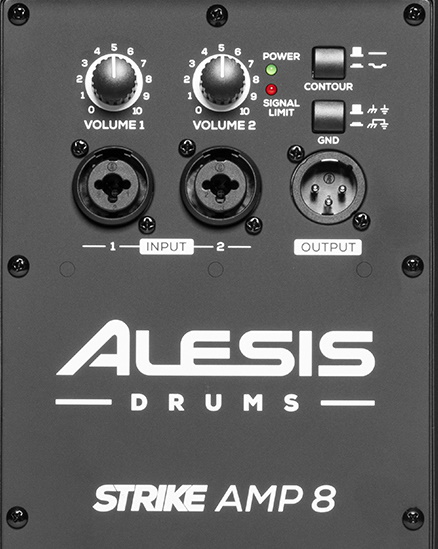
| Website | Source | *Rating Value |
| YouTube | 65 Drums | 92/100 |
Roland PM-100
- Limited 2-band EQ
- Lacks extra features like Bluetooth connectivity
- Solid low-end depth
- Plenty of volume for practice and jams
- Simple and reliable operation
- Top-notch build quality and durability
Roland and Alesis are ever present in the electronic drum set market and it's no surprise that both companies occupy multiple spots on our recommended list.
While Roland remains the brand to beat when it comes to most things electronic drum kits, Alesis has one-upped it in the drum amp department with its Strike 12 electronic drum amplifier. It continues to garner the highest Gearank Rating of this edition. Still, the PM-100 is no slouch with its lower price point and its combination of reliable performance and build quality.
Although only pumping out 80 watts, this drum monitor has respectable bass due to its relatively big 10" woofer especially compared to the Strike 8. It can go loud when needed and provides great response notably in the bass region.
It has good transparency that allows authentic reproduction of your e-drum sound and dynamic nuances. Still, if you're jonesing for more watts, the PM-200 might be better suited for you.
The PM-100 sports a more spartan tone-shaping configuration with just 2 knobs that control the treble and the bass. However, along with its separate inputs for your e-drums and 2 sizes of line input jacks for play-along, this is enough for most people's practice setup. Those who need more control might be put off by this limitation though.
The construction overall is high-grade and durable as expected from Roland. This, together with its sound quality, makes this electronic drum amp easy to recommend. Who doesn't want an easy-to-use drum amp that sounds good, has good volume, and will reliably work for a long time?
Although lacking some fancy features such as Bluetooth and is not exactly stylish, this does the job and it does it well. This is a choice worthy of the Roland name.
Specifications
- Inputs & Outputs: 1/4-inch Stereo phone type V-Drums INPUT, 1/4-inch Line-in Stereo phone type, 1/8-inch Stereo miniature phone type
- Bluetooth Capability: None
- Output Power: 80 Watts
- Weight and Size: 29 lbs, 20.2 lbs, 15-5/16" x 16-1/16" x 13-15/16"
- Driver and Speaker Size: 1 x 10" Woofer, 1 x 2" Tweeter
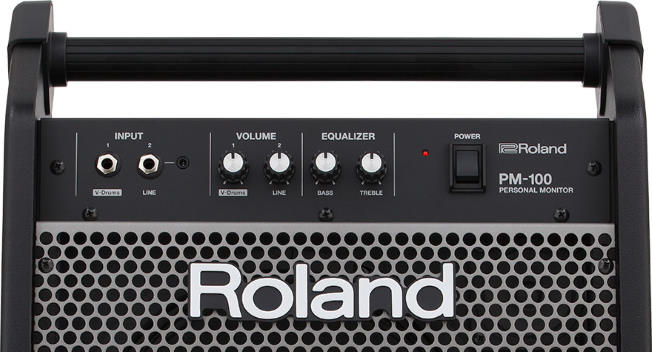
| Website | Source | *Rating Value |
| YouTube | Kevys RC & Music | 80/100 |
Alesis Strike Amp 12
- Controls aren't easy to access
- Limited EQ options
- Deep bass courtesy of 12" woofer
- Good midrange clarity and crisp highs
- Enough projection for stage use
- Versatile positioning and good build quality
Now we come to the Alesis Strike 12, which has maintained its status as the best drum amp for many years now. Sharing a lot of what's good with Strike 8, the Strike 12's larger woofer size serves as the breakaway feature that helped it edge out Strike 8 by 2 whole Gearank Rating points with many recommending this over Strike 8 just for the bigger speaker system alone.
Although Alesis chose to promote this drum amp's peak power rating instead of the more common continuous rating for pro gear, it is loud enough for use as a Stage Monitor with a band and has enough projection to be the main drum amp for small venues.
And it's not just about volume, because it does a good job of providing the low-end punch needed for kick sounds while still producing crisp highs on cymbals.
Note: Alesis has already released the Strike Amp 12 mkII recently but it still hasn't received lots of user feedback. We still vouch for the effectiveness of the first version. Stay tuned for more updates in the future!
This features the same great build quality of the Strike 8, XLR output for chaining with a second drum amp or external mixer, and a clip indicator that lets you know when things are about to get distorted. Like the Alesis Strike 8, this can be positioned and many different ways and will serve multiple needs from the house to rehearsal space, to stage.
Note that controls are on the back of the drum amplifier, so you'll have to stand up and move to the back to make adjustments. Also, this shares the limited EQ options of the Strike 8 with only a contour switch.
There's a reason why the Strike 12 continues to be the highest rated among the many best electric drum amp options today. It is a great choice for the discerning e-drum player, it would be hard to go wrong with this electronic drum amplifier.
Specifications
- Inputs & Outputs: 2 x XLR/TRS 1/4-inch combo inputs, 1 x XLR line out
- Bluetooth Capability: None
- Output Power: 2000 Watts Peak / 1000 Watts Continuous
- Weight and Size: 35.12 lbs , 23.76" x 13.68" x 13.92"
- Driver and Speaker Size: 1 x 12" Woofer, 1 x 1" Tweeter
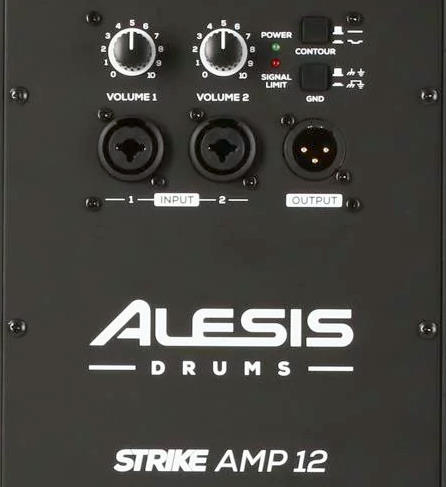
| Website | Source | *Rating Value |
| bonedo | Alexander Berger | 80/100 |
Roland PM-200
- Limited 2-band EQ controls
- Quite bulky and heavy
- Deeper bass with plenty of headroom
- Impressive clarity, even at high volume levels
- Stage-ready XLR outputs
- Reliable operation and long-term durability
Now we come to our last and highest-priced contender, the behemoth Roland PM-200 electronic drums amp, sporting a 12" woofer for deep lows.
Given its bigger profile, the low-frequency response is good, and thanks to its great headroom, the deep kicks sound does not drown out the mids and higher frequencies. It retains clarity across the spectrum with no problems, and it does so at loud volumes. The sound it produces is also punchy, something that you can also feel and not just hear. By its sound alone, many consider it a quality drum amp.
Note that this e-drums amp features the same simple configuration as the PM-100 with a basic 2-band EQ but with a much higher power rating of 180 watts instead of 80.
It's pricier than the Strike 12 again possibly due to the established brand reputation that Roland has. The price though, is also justified by it being a high-quality drum amp with a lot of power and low end. The Strike 12 has more features and flexibility which might explain the slightly higher Gearank score. But the Roland PM-200 advantage is its reliability and high headroom.
Given its bigger woofer, the PM-200 is quite bulky and heavy, but all these are justified by how well it handles drums. It can easily beat out guitar amps and keyboard amps, and can even handle bass guitars. It has enough juice to amplify a jam session with a bass player plugged into the line input while you are going through Roland's V Drums input as demonstrated here:
Just make sure that your bass player has a way to convert his instrument-level output into a line output (more on this here), a Bass Preamp will do the trick if needed.
With its Dual XLR direct outputs, you can go straight to the house or into an audio interface while monitoring the PM-200 in all its glory. This makes it a true stage-ready electric drum speaker.
All in all, this is a premium choice that works especially well if you have a set of Roland V-Drums. This was specifically optimized to that sound profile. If you want the beefiest Roland drum monitor out there, you're going with the PM-200.
Specifications
- Inputs & Outputs: 1/4-inch Stereo phone type V-Drums INPUT, 1/4-inch Line-in Stereo phone type, 1/8-inch Stereo miniature phone type
- Bluetooth Capability: None
- Output Power: 80 Watts
- Weight and Size: 46 lbs 5 oz, 18-1/16" W x 18-1/2" D x 16-9/16" H
- Driver and Speaker Size: 12" Driver, 1" Tweeter Horn
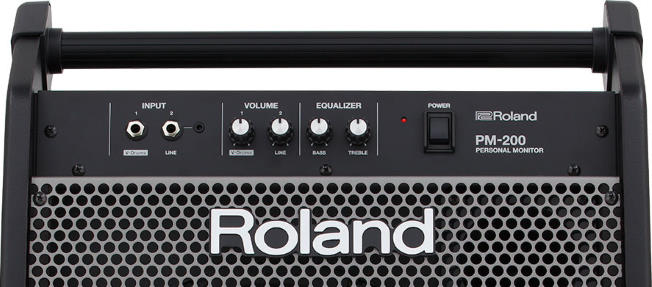
| Website | Source | *Rating Value |
| YouTube | Ben Minal | 96/100 |
Drum Amp Alternative for Quiet Practice
Audio-Technica ATH-M50x
- Faux leather will peel-off after some time
- Foldable and easy to store
- Good sound isolation
- Good enough quality for practice and tracking
The Audio Technica M50x headphones is known to be a go-to headphones. As e-drum monitors, it will give you the clarity you need for silent practice.
Although I'd love to have a drum amplifier at home for my e-drums (The Strike 12 is my personal recommendation), restrictions in sound, space and budget has relegated that dream a bit further out into the future for me (I use an older DDA50 in the rehearsal studio).
Good thing I have my Audio Technica M50x, a multi-purpose pair of headphones that excel in non-critical monitoring situations such as tracking and playing my Yamaha DTXpress E-kit.
What's good about this pair of cans is that they are foldable, easy to store, and have relatively good sound isolation due to them being a closed-back, and they come with lots of detachable wire options and a storage pouch.
So for those late night practice, you might want to plug these in to avoid disturbing your family and neighbours. The M50x is an affordable alternative that's has good clarity for a silent option.
Specifications
- Driver Size: 45 mm
- Frequency Response: 5 Hz to 35 kHz
- Impedance: 80 Ohms
- Sensitivity: 96 dB
- Max Input Power: 100 mW
- Weight: 270g without cable (0.55 lbs)
- Connectivity: 3m coiled cable with a gold plated 1/8" plug and 1/4" adapter.
For other suitable headphones, do check out our guide to Closed Back Headphones.
| Website | Source | *Rating Value |
| Gearank | Alden Acosta | 92/100 |
| Sound On Sound | Sam Inglis | 85/100 |
| Pocket-lint | Mike Lowe | 100/100 |
| Mixdown | Editor | 90/100 |
Things To Consider When Buying an Electronic Drum Amp
-
This determines the flexibility of your setup options. XLR or Balanced Inputs are better for electronic drums and keyboards. Another common input is the AUX input where you can send your play-along music to. Having lots of different inputs and outputs allows you to plug different sound sources into your drum amp and send out that audio into mixers, audio interfaces and sometimes other, bigger speakers for performance use. You also have to consider drum EQ functionality for shaping your sound.
- This is a feature I'd like to see more often. Bluetooth is often relegated to playback duties and not for playing completely wirelessly. I'd like to see more truly wireless options but playing electronic drums requires a very low latency connection to feel even barely decent and we might not be there yet tech wise.
-
This can determine how loud it gets. But it's not always that simple.
More technical people would explain that Watts are more the measurement of electrical power that gets converted to sound power depending on efficiency (some energy is wasted, turning into heat). Unfortunately manufacturers can be less than transparent when stating the output power of their electronic drum amplifiers. There is a difference between peak power and continuous power that they sometimes don't specify - Peak can only be used for a short time, while the lower rated continuous is the actual power level you can play at consistently without overheating or distortion. But still generally, anything below 100 watts is meant for personal monitoring and anything above that should give you the power for bigger spaces and louder bandmates! Sometimes a low watt drum amp can go loud but it will start to sound distorted at a lower volume. Great for electric guitar, nasty for e-drums and keyboards.
- There is usually a tradeoff in weight and size to power and volume. Loud and light is not usually a combination that goes together, but other things can factor in on this such as build quality and materials used.
- The woofer size determines the bass response, how low your amp can "sing" the low freqeuncies, while the tweeter size is less relevant as they're generally sized correctly for the high frequencies. It's good to have both a woofer and a tweeter with electronic drums being full-range instruments capable of both the very high for the cymbals and snare overtones and the very low for bass drum and floor tom. Low end is even more important if you use bass heavy samples like those from the popular Roland 808.
Number & Type of Inputs & Outputs
Bluetooth Capability
Loudness and Output Power (watts)
Weight and Size
Driver and Speaker Size
Can a guitar amp be used for drums?
The short answer is no. Guitar amps are voiced specifically for electric guitars. They won't have the treble needed for the cymbals and hi-hats, and they won't have the lows needed by the toms and kick drums. But if there's nothing else to use, you can plug into a guitar amp, but only use it at low volumes. Another alternative would be bass amps, they have enough low end to make your electronic drum kit sound full. But going the bass amp route will leave you wanting more high frequencies. A better alternative is to use a keyboard amp, which has wider frequency response. A good keyboard amp can be a great electronic drum amp, and are viable as electronic drum monitors.
Best Electronic Drum Kit Amplifier Selection Methodology
The first Edition was published in 2017.
We started by looking at all of the drum amplifiers and electronic drum monitor options listed by music gear retailers in the USA. And for this edition, we ended up short-listing 19 of the most promising options for detailed analysis - see the list in the Music Gear Database, which includes other popular drum amplifiers like the Kat Percussion KA1 and CoolMusic DM20. We then gathered and analyzed over 3,900 customer and expert reviews as well as forum discussions, and all these data were fed into the Gearank Algorithm to produce rating scores out of 100 for each one in order to select the highest rated types of amps to recommend above. Like what we normally do, we've also included summaries of what the market considers as the pros and cons for each of the top rated drum amps. For more information about our methods see How Gearank Works.
About the Author and Contributors
Here are the key people and sources involved in this guide's production - click on linked names for information about their music industry backgrounds.
Lead Author & Researcher
Alden Acosta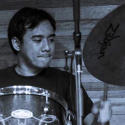
I'm a drummer and former lead guitarist of the band Callalily, a platinum selling multi-awarded band from the Philippines. I also studied music for 6 years majoring in percussion and jazz studies with a minor in classical piano.
The drumming gear I use includes Zildjian Cymbals, Gretsch Drums (acoustic), Yamaha electronic drum set, Evans Heads, Pearl Hardware and Vic Firth Sticks and Earplugs.
Contributors
Alexander Briones: Supplemental writing.
Allen Articulo: Co-writer.
Jason Horton: Editing and Illustrating.
Media
Main/Top Image: Created by Gearank.com using a photographs of the Roland PM-100, Alesis Strike Amp 12 and Donner DA-35.
The individual product images were sourced from websites, promotional materials or supporting documentation provided by their respective manufacturers, except for the additional Audio-Technica ATH-M50x photograph which was taken by the author.
The video has been embedded in accordance with YouTube's Terms of Service.
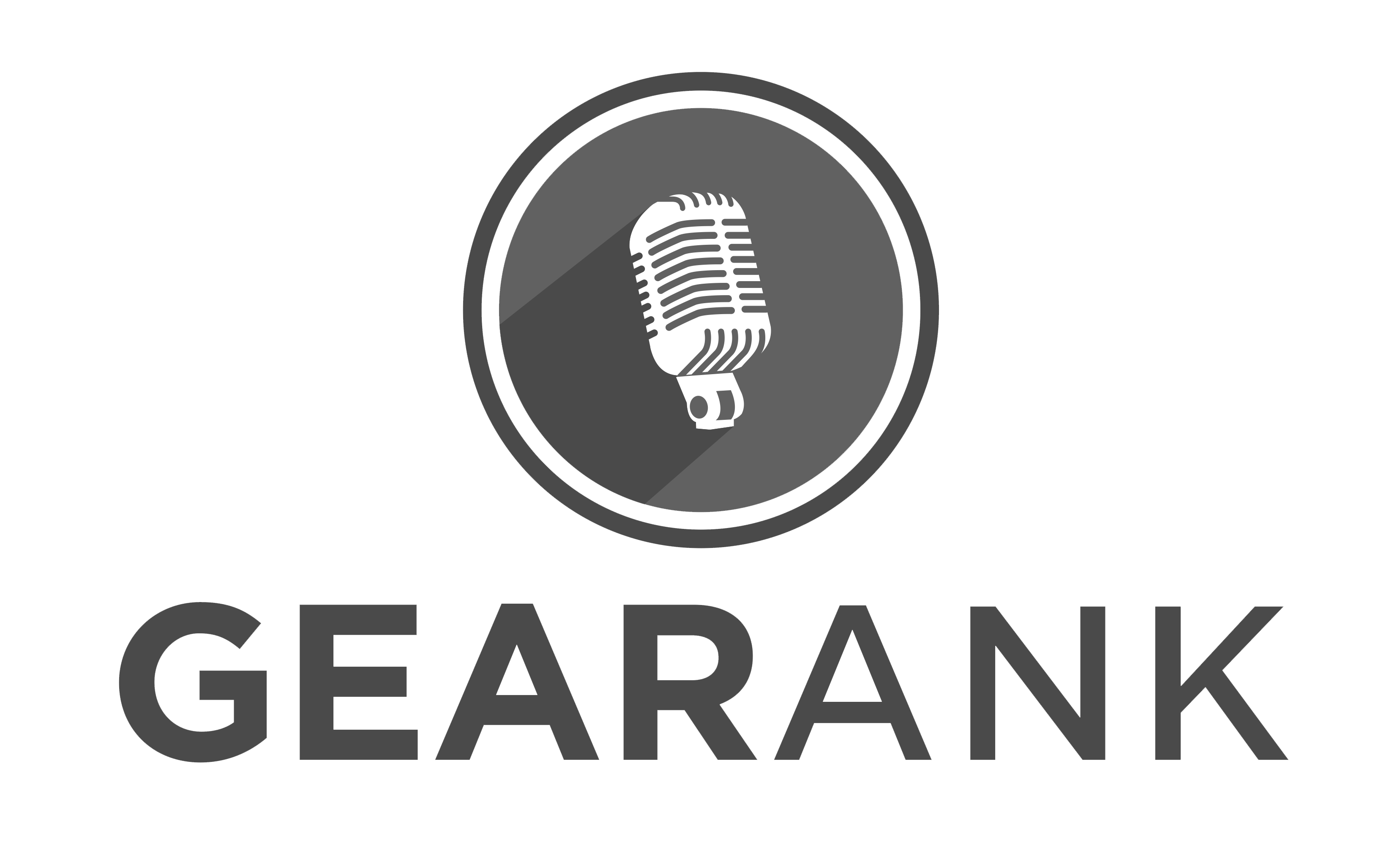

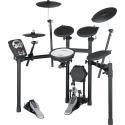
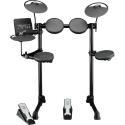
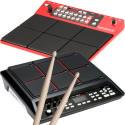
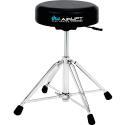
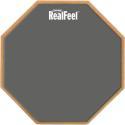
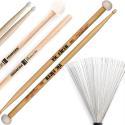
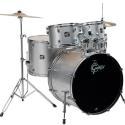
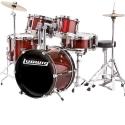
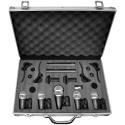
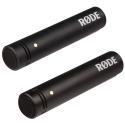
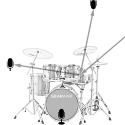
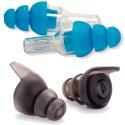
The Traynor DW10 came off the recommended list above when we published the April 2022 Edition today.
Publication of our May 2021 edition resulted in the following amps coming off the recommended list above, but you can still see our analysis of them:
As a result of our April 2020 update, the following came off our recommended list but you can still read our analysis of it: Simmons DA25.
Hi. In late 2019 you removed the ddrums and kat amps, but I still see them in the list above. Does this mean they were added back to the list? Thanks!
We currently don’t have any amps from Ddrums in the recommended list above.
The KAT Percussion KA2 was removed from the recommended list also – it’s a different model to the KAT Percussion KA1 that we currently recommend.
Hi all, has anybody on this forum tried either the Alesis Strike amp 12-2000 or the Traynor DW10 drum amps? If so, what is your opinion on their respective sounds and features? THANKYOU!!!
The Alesis Strike Amp 12 is currently the highest rated option on the market, so that’s the one I’d recommend you go with.
Unfortunately, although we did look at the Traynor DW10 for the update we published today, we weren’t able to gather enough information about it to publish a rating or provide any useful advice about it. The little bit of feedback I’ve seen is very positive and it’s on our short-list to be looked at again when we next update this guide.
Update: We have now published a rating for the Traynor DW10 – you can see it here.
It’s not quite rated high enough for us to recommend it right now, but if the reviews continue to be positive it has a reasonable chance of receiving our recommendation in the future.
As a result of our October 2019 update the following amps came off our recommended list above:
I’m looking to replace my Alesis Transactive Drummer with the Roland PM-200. The Alesis has the headphone jack input while the Roland does not. The headphone sound is great when plugged directly into the Alesis as opposed to the Roland TD-17 Module. How can I get that great sound via headphones directly from the PM-200
Many drum amps, including the PM-200, don’t have a headphone out presumably because electronic drum modules do.
If you really wanted to, you could use the DI outs (XLR connectors), put them into a mixer, and take the headphone out from the mixer.
What is going on with the kat 400 hd 2.1 percussion sound system i can’t hardly find one to purchase and if I do find one is it a good choice for electronic drums,maybe it is not being made any more,would like to know the history,who makes it and where , I need help in making a decision on what to do please educate me
Read your comment from 2019. I have the 400 watt Kat amp with satellites speakers. It is a great system for e drums, plenty loud and the system has plenty of controls to custom tailor your sound. In fact, with a mixer you can use it on acoustic drums and play cd’s to play with, and it sounds like a live band. The only problem is that not shortly after I purchased mine, I believe they discontinued it, and only make the 200 watt version without satellites. It was expensive I guess, that is the only reason I can see. Keep checking around to find one, you won’t be disappointed if you do
Hi!
First of all, thanks for all the info – really interesting!
I have come accross the Roland CM-220, with a pair of satelite speakers.
Do you know this one? Do you have any opinions on it, please?
I want to use for small gigs with friends and the speakers do appeal to me since I can have more than one source of sound out of the speakers, in a way I can possibly direct them to me if needed.
Thank you so much!
Roland discontinued the CM-220 Cube Monitor System a few years back so we haven’t analyzed them for Gearank.
You can still get information about them from the Roland website.
Is it recommended to use cross Brands for electronic drums and amplifiers? Say like the Roland TD-17KVX set with maybe a KAT 2 amplifier?
I use a Td11kv & a Kat2 200w amp.. great together..
That’s perfectly fine – you don’t need to use the same brand of amplifier and drum kit.
This is the worst list I’ve ever seen. No mention about Simmons DA350, it smokes all of them. Although it’s nothing to “write home to mom about”. Drum amps are the most disappointing pieces of equipment in technology. In comparison to headphones the sounds through an amp sound laid-back in a background (very flat and muffled. The sound needs to be brought more forward. Sounds like wet ass-slap. Snares do not sound good at all. Very disappointing to say the least. That’s the reality of “drum amps”.
You can see our rating for the Simmons DA350 here.
Unfortunately it’s no longer available so we don’t include it in any of our recommended lists.
Funny how you picture a Simmons DA200S in your front page intro and then don’t include it in the list of top amps.
Thanks for pointing that out.
The image was only meant to illustrate the theme of the guide rather than the content, but I see your point so I’ve updated the image.
I have a alesis crimson 2 electronic drum kit. Will the Rolland pm 200 reproduce a good solid rock sound.?
I have checked the latest reviews and although I didn’t see anyone who said they used this amp with the Alexis Crimson, most people only had good things to say about the amp including several who said the Roland PM-200 is better than amps they’ve used from other brands, so I would think it would be a good option for rock sounds.
I use a pair of Mackie Thump 15″ speakers and am still looking at adding a 15″ subwoofer. Plus you don’t use a monitor with Edrums you use reasonable headphones, not great ones as they may be too bassey. Playing live requires quality and quantity of sound if you want to replace the sound of an acoustic kit.
This sounds like the best option recreating the acoustic sound in the snare toms and cymbals is very important to me as its RnB hip hop i will definitely get a sub for those super low 808 as well
I am a Drum student and have Yamaha 450 digital drums, my children plays digital piano and have Yamaha Digital piano they are also into Vocals. Could you please recommend a Monitor to use for home usage to connect all these requirements, would the idea of all purpose will help and do you have any recommendations. Thanks in Advance.
If only one of you will use the amp at a time, then a basic Keyboard Amp like the Peavey KB 1 would be a cost effective solution.
If you all want to play through it at the same time, then a multi channel amp like the Behringer K450FX will let you do that but both the electronic drums and digital piano will only be able to provide a mono signal.
If you all want to play at the same time and in stereo, then a small PA system like the Behringer PPA500BT will do the job.
I agree the Simmons DA200S is by far the best amp choice. I solved the weight problem by adding set of swiveling castors to the bottom using bolts into T nuts. Works great.
I bought the Simmons DA200s, because of all the positive comments I read, but never actually heard it. It is a solid and great sounding amp, but tried to use it to practice with my band, and it just wasn’t loud enough to keep up. Great amp to use by yourself or use it as a monitor in a band situation.
Thank you for the review! This was very in depth and enlightening. The “Things to consider…” section was very valuable. Thanks again!!!
No problem. Thank you for the feedback.